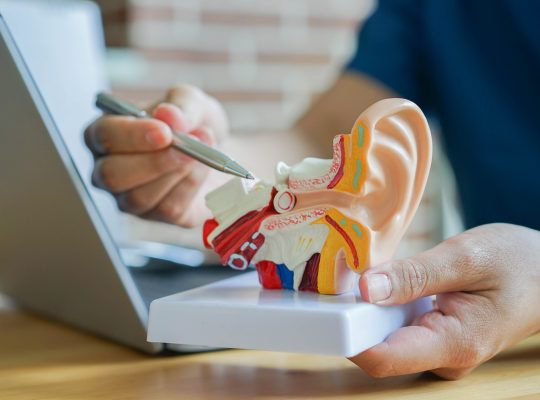Alcohol is one of the most widely consumed substances worldwide, and it has many effects on the body. One of the less discussed effects of alcohol consumption is its impact on your hearing. In both the short and long term, alcohol can have harmful effects on hearing, from temporary hearing loss to more serious damage to the hearing system. In this blog, we discuss the different ways alcohol can affect your hearing, the potential risks and what you can do to protect your hearing.
How alcohol affects your hearing
Alcohol affects various parts of the hearing system, from the inner ear to the brain. With low to moderate alcohol intake, the effects can be subtle, but with excessive consumption, alcohol can cause damage that is long-lasting or even permanent.
Temporary hearing problems caused by alcohol
After drinking alcohol, many people may notice temporarily impaired hearing. This is because alcohol suppresses the central nervous system, which affects how we process sound. Hearing may be temporarily impaired, which can result in a muffled or dull sense of hearing. This is a temporary side effect that disappears once the alcohol breaks down in your body.
Alcohol and the blood supply to the hearing organ
Alcohol affects blood circulation in the body, and blood flow to the inner ear can also be reduced. The inner ear is the part of your ear responsible for converting sound waves into electrical signals that are sent to the brain. When the blood supply to the inner ear is disrupted, it can interfere with the functioning of the hair cells in the ear, which are crucial for hearing. This can lead to temporary hearing problems, such as tinnitus or impaired hearing.
Long-term hearing damage from alcohol
Long-term excessive alcohol consumption can lead to permanent hearing damage. Alcohol has been shown to increase the risk of hearing loss, especially when combined with other factors such as noise exposure. With chronic alcohol consumption, the hair cells in the inner ear can become damaged or even die, leading to permanent hearing loss.
Another way alcohol can be harmful to hearing over a long period of time is by interfering with the function of the inner ear and auditory nervous system. Long-term exposure to alcohol can cause damage to the nerves involved in the hearing process, which can eventually lead to permanent hearing damage.
Alcohol and tinnitus
Tinnitus, or tinnitus, is a condition characterized by hearing sounds such as ringing, humming or whistling in the ears, without an external source of sound being present. Tinnitus can be caused by a variety of factors, including excessive alcohol consumption.
Alcohol can increase blood pressure, which can contribute to the development of tinnitus. In addition, alcohol can affect the nervous system, which can increase sensitivity to sound. As a result, people who are prone to tinnitus may find that their symptoms worsen after drinking alcohol.
The relationship between alcohol and noise-induced hearing damage
One of the main risks of alcohol consumption in relation to hearing damage is increased vulnerability to noise. When you consume alcohol, your body loses its ability to process sound effectively, leading to reduced protection from noise. People under the influence of alcohol are at greater risk of hearing damage from exposure to loud noises, such as at concerts, clubs or other loud environments.
Alcohol lowers your body’s response to loud noise, making you less likely to notice the harmful effects of noise pollution. This can cause you to stay longer in noisy environments without protection, increasing the risk of permanent damage to your hearing.
How alcohol affects the brain and hearing
The brain plays a crucial role in how we perceive sound. Alcohol affects the brain, particularly the brain regions responsible for processing sound and hearing. Long-term exposure to alcohol can lead to changes in the way the brain processes sound, which can result in hearing problems.
Long-term alcohol consumption can cause changes in the connections between the brain cells involved in hearing. These changes can lead to a reduced ability to properly interpret sounds, even when the hearing itself is in good condition. This phenomenon is often associated with the so-called “sensorineural hearing loss,” in which the brain is unable to process sounds properly despite the hearing system being intact.
Risk groups: Who is more at risk for hearing damage from alcohol?
Although everyone who consumes alcohol is at risk for hearing problems, there are certain groups that are more vulnerable to hearing damage from alcohol:
- People who are often in noisy environments: Such as musicians, DJs or construction workers, who are regularly exposed to loud noises.
- People who are heavy drinkers: Chronic alcohol consumption is more likely to cause permanent hearing damage.
- People who have ear pain or a hearing problem: For people who already have hearing loss or ear pain, alcohol can worsen symptoms or make the situation worse.
Preventing hearing damage from alcohol
While it is difficult to completely avoid alcohol affecting your hearing, there are some measures you can take to reduce the risks:
- Moderation is the key: Try to limit alcohol consumption and ensure a healthy balance. There is no need to overdo it every time you drink, especially if you know you are prone to hearing problems.
- Wear hearing protection: If you are regularly exposed to loud noises, such as at concerts or clubs, wear hearing protection to prevent damage to your hearing.
- Avoid prolonged exposure to noise: Try to limit the number of times you are in noisy environments, especially if you have been drinking.
- Be aware of your hearing: Pay attention to the signals your body gives and take the necessary steps to protect what is still intact.
Conclusion
Alcohol not only affects the liver, heart or brain, but it can also have harmful effects on your hearing. From temporary hearing loss to permanent damage to the hearing system, alcohol affects your hearing in multiple ways. It is important to be aware of these risks and take precautions, such as limiting alcohol consumption and wearing hearing protection in noisy environments. This way, you can protect your hearing and enjoy your long-term health.








